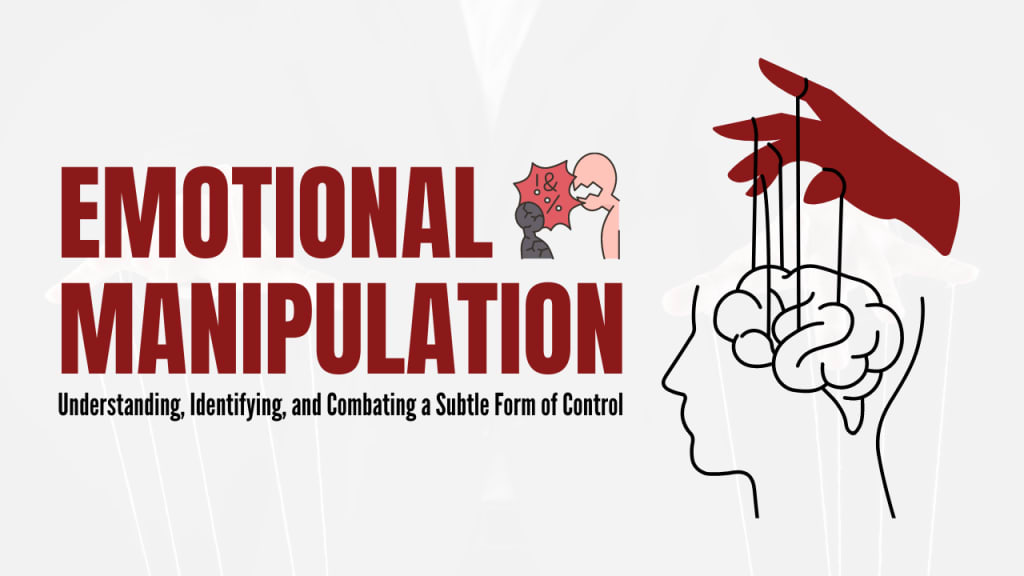EMOTIONAL MANIPULATION
Understanding, Identifying, and Combating a Subtle Form of Control

Emotional manipulation is a complex and often insidious form of psychological influence where one person uses tactics to control, exploit, or influence another's feelings and behaviors. Unlike physical manipulation, which is overt and often immediately recognizable, emotional manipulation operates under the radar, making it difficult to detect and even harder to address. This article delves into the nuances of emotional manipulation, exploring its mechanisms, identifying signs, and offering strategies for those who find themselves ensnared in its web.
The Anatomy of Emotional Manipulation
Emotional manipulation hinges on power dynamics and control. Manipulators deploy a variety of techniques to achieve their goals, including guilt-tripping, gaslighting, passive-aggression, and playing the victim. These tactics are designed to undermine the target’s sense of reality, self-esteem, and autonomy, ultimately bending their will to the manipulator's desires.
1. Guilt-Tripping: This involves making the victim feel guilty for their actions or inactions, regardless of whether the guilt is justified. Statements like "If you really loved me, you would..." are classic examples.
2. Gaslighting: This is a particularly nefarious form of emotional abuse where the manipulator makes the victim doubt their own memories, perceptions, and sanity. Over time, this can erode the victim's confidence and sense of self.
3. Passive-Aggression: Here, the manipulator expresses their hostility indirectly through procrastination, sullenness, or intentional inefficiency, rather than confronting the issue directly.
4. Playing the Victim: Manipulators often portray themselves as the victims in situations to elicit sympathy and to deflect blame or responsibility. This tactic not only garners undeserved sympathy but also puts the real victim in a defensive position.
Identifying Emotional Manipulation
Recognizing emotional manipulation can be challenging because it often unfolds gradually and subtly. However, there are several red flags to watch for:
- Inconsistent Behavior: Manipulators often display erratic behavior, being warm and affectionate one moment and cold or hostile the next.
- Blame Shifting: They frequently deflect responsibility and blame others for their problems or mistakes.
- Excessive Criticism: Persistent criticism, often disguised as "constructive feedback," that undermines your confidence and self-worth.
- Isolation: Manipulators may attempt to isolate their victims from friends, family, or support networks, making them more dependent on the manipulator.
- Conditional Affection: Their affection and approval are often conditional, based on whether the victim complies with their demands or expectations.
The Psychology Behind Manipulation
Emotional manipulators often possess certain psychological traits that enable their behavior. They may have narcissistic tendencies, characterized by an inflated sense of self-importance and a lack of empathy for others. Alternatively, they may suffer from borderline personality disorder, which involves intense and unstable relationships, fear of abandonment, and manipulative behaviors.
At the root of manipulation is often a deep-seated insecurity. Manipulators seek control over others to compensate for their own feelings of inadequacy and powerlessness. By controlling others, they temporarily assuage their own fears and anxieties, although this is usually a short-term fix that exacerbates their underlying issues in the long run.
Combating Emotional Manipulation
Addressing emotional manipulation requires a multifaceted approach:
1. Awareness: The first step is recognizing the manipulation. Educate yourself about the tactics and signs of emotional manipulation.
2. Boundaries: Establish and maintain clear, firm boundaries. Communicate these boundaries assertively and consistently.
3. Support Systems: Reconnect with friends, family, or support groups. Isolation is a common tactic used by manipulators, so building a strong support network is crucial.
4. Professional Help: Seek the guidance of a therapist or counselor. Professional support can provide strategies to cope with manipulation and rebuild self-esteem.
5. Self-Care: Prioritize your well-being. Engage in activities that bolster your mental and emotional health, such as exercise, hobbies, and mindfulness practices.
6. Exit Strategies: In cases where the manipulation is severe and persistent, it may be necessary to distance yourself from the manipulator. This could mean ending the relationship or limiting contact to protect your mental health.
Emotional manipulation is a pernicious form of psychological control that can have profound and lasting effects on the victim's well-being. By understanding the tactics used by manipulators, recognizing the signs, and employing strategies to combat this behavior, individuals can reclaim their autonomy and rebuild their self-worth. It is a journey that requires courage, resilience, and often external support, but it is a crucial step toward healthier, more authentic relationships and a more empowered self.
About the Creator
ASMAU AHMAD
Asmau Ahmad, is an exceptional writer who captivates readers with her engaging and inspiring storytelling. Her works cover a wide range of topics and seamlessly combine intellect and originality.





Comments
There are no comments for this story
Be the first to respond and start the conversation.